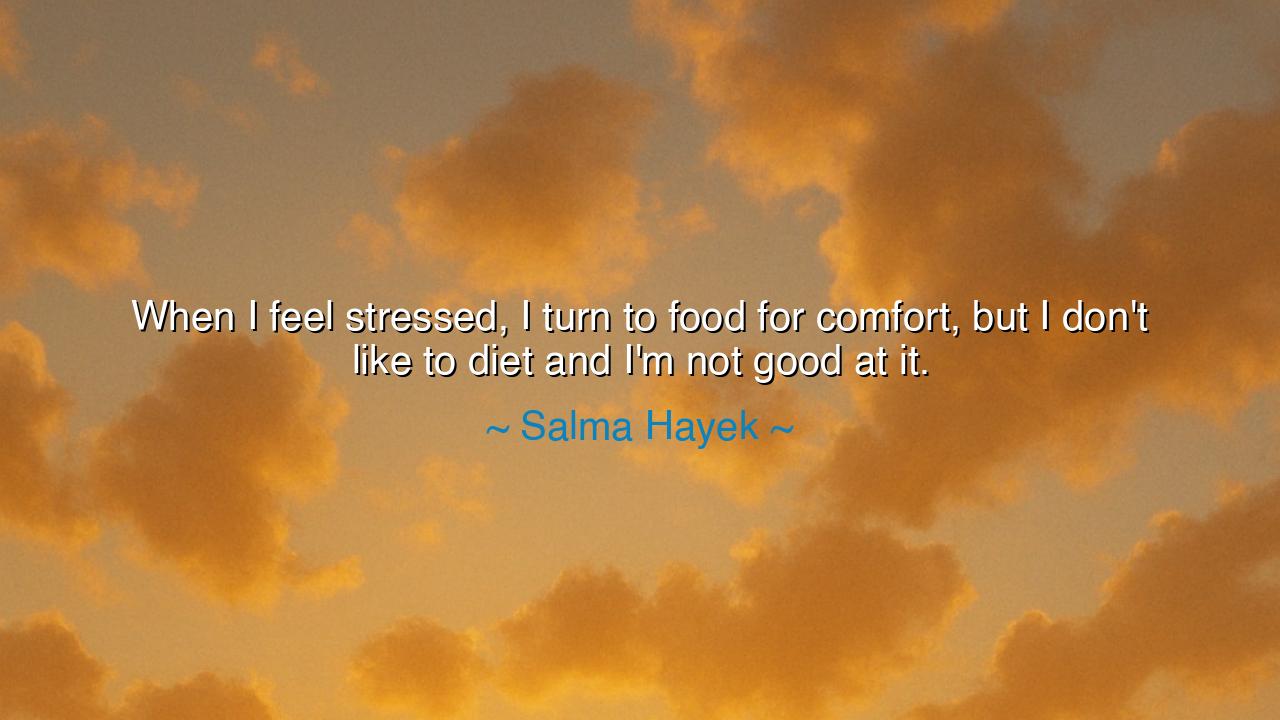
When I feel stressed, I turn to food for comfort, but I don't
When I feel stressed, I turn to food for comfort, but I don't like to diet and I'm not good at it.






In the heartfelt confession of Salma Hayek, there shines a truth that belongs not only to her but to all who have known the weight of weariness: “When I feel stressed, I turn to food for comfort, but I don’t like to diet, and I’m not good at it.” Her words are tender, honest, and profoundly human. They speak to that eternal struggle between the body’s longing for ease and the mind’s yearning for control. Here is no pretense of perfection—only the brave admission of a soul seeking balance between the demands of the world and the needs of the heart.
The ancients would have heard in her words a lesson older than time: that stress—the burden of life’s noise—drives even the strongest among us toward what soothes rather than what strengthens. To turn to food for comfort is not mere indulgence, but a reaching back toward the warmth of nurture, toward the primal peace of being cared for. In the act of eating, especially when the spirit is weary, one seeks not only sustenance, but solace. For when the world wounds us, the simplest of acts—breaking bread, tasting sweetness—reminds us that life still offers gentleness.
And yet, Hayek’s admission that she does not “like to diet” and is “not good at it” reveals the second half of this eternal dance: the struggle with discipline. The ancient philosophers, from Aristotle to Seneca, spoke often of the battle between desire and temperance. They did not condemn the body’s hunger, but they warned against allowing it to rule the soul. Seneca once wrote that “he who is his own master is greater than he who conquers cities.” Hayek’s words, though humble, echo this wisdom. To know one’s weakness is the beginning of mastery. She does not hide behind denial or pride; she names her truth, and in doing so, steps closer to understanding it.
Consider the story of Emperor Ashoka, ruler of India, who after a life of conquest was consumed by guilt for the suffering he had caused. To calm his tormented spirit, he sought peace in luxury and feasting—but peace eluded him still. Only when he turned inward, embracing simplicity and moderation, did he find true healing. Yet even in his transformation, he confessed that the struggle never left him; the desire for comfort remained. Like Hayek, he learned that discipline is not the absence of craving—it is the daily practice of choosing awareness over impulse, one humble act at a time.
Hayek’s honesty teaches us that to be human is to live within contradiction. We crave comfort, yet we long for control. We wish to feel free, yet we build our own prisons of expectation. Her refusal to pretend perfection becomes a kind of strength. It reminds us that peace is not found in denying our humanity, but in befriending it. There is grace in admitting, “I am not good at this,” for such humility opens the door to self-compassion—and through compassion, true change can begin.
There is also wisdom in her rejection of harshness toward herself. Many in their pursuit of health or beauty turn discipline into punishment, and diet into despair. But Hayek’s words carry gentleness. She does not speak of guilt or shame; she speaks of comfort. She reveals a path that is tender rather than cruel—a way of understanding the body not as an enemy to be conquered, but as a companion to be cared for. This is the ancient balance the Stoics called euthymia—a quiet harmony of body and soul, achieved not through force, but through awareness and kindness.
So, what is the lesson to draw from this confession of the heart? It is this: do not despise your comforts, but learn from them. When you reach for food, for rest, or for ease, ask what your soul truly hungers for. Is it sweetness, or is it peace? Is it fullness, or is it rest? Seek nourishment, not escape. Let your moments of indulgence remind you that you are alive, and let your moments of restraint remind you that you are strong. Between the two, build a rhythm of balance that honors both the heart and the body.
And finally, remember the wisdom the ancients passed down through every age: that moderation is freedom. To live without denying joy, yet without being ruled by it—that is mastery. Salma Hayek’s simple confession, spoken without artifice, is the voice of every person striving to live wisely in a world of temptation. It reminds us that perfection is not the goal—harmony is. To know oneself, to forgive one’s lapses, and to continue walking the path toward peace—that is the true diet of the spirit, and the sweetest nourishment of all.






AAdministratorAdministrator
Welcome, honored guests. Please leave a comment, we will respond soon